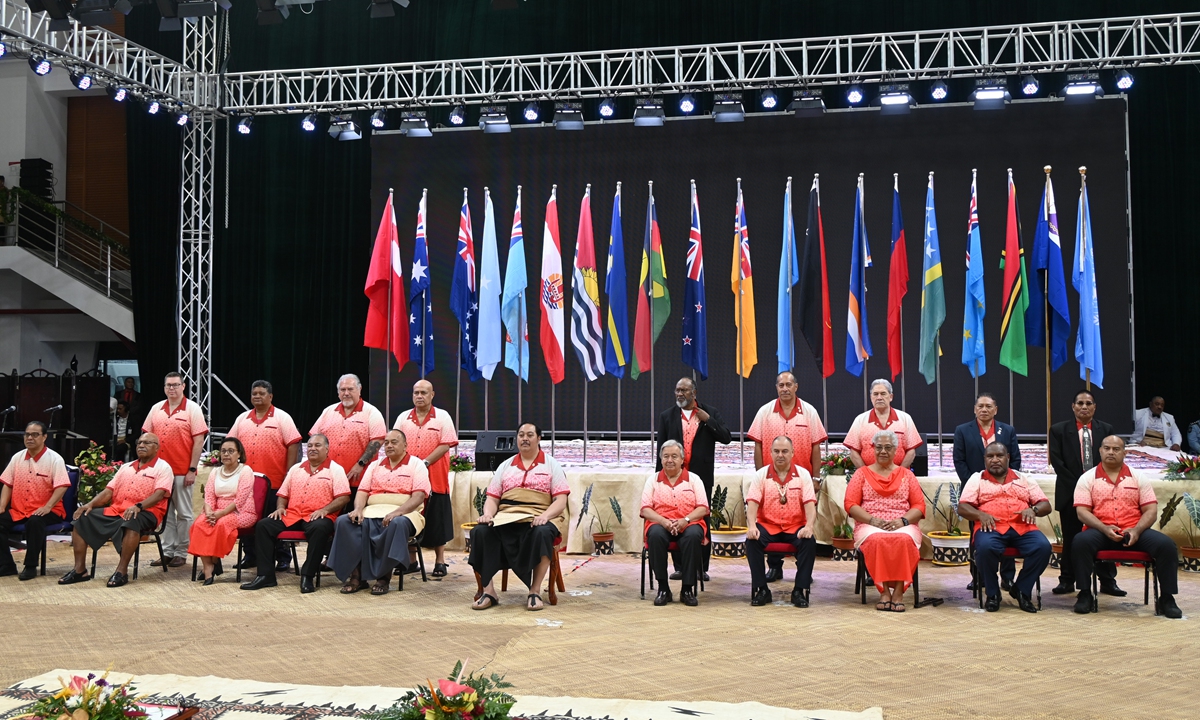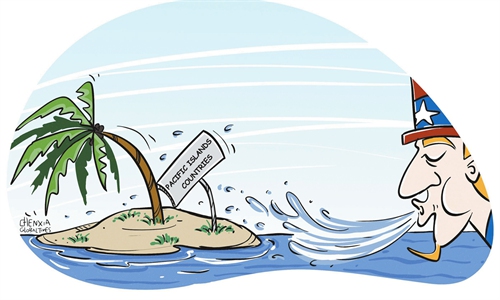‘Vying for power’ narrative ahead of PIF meeting exposes Western narrow-mindedness: expert

Tonga's Crown Prince Tupouto'a 'Ulukalala (center left), United Nations Secretary-General Antonio Guterres (center right) and leaders attend the 53rd Pacific Islands Forum Leaders Meeting in Nuku'alofa, Tonga, on August 26, 2024. The meeting will be held between August 26 and 30. Photo: IC
As leaders of Pacific Island Countries (PICs) convened on Monday in Nuku'alofa, capital of Tonga, to discuss and respond to the region's challenges including climate change and economic growth, partnership with China has become an inevitable topic on the agenda.
Analysts said that PICs' win-win cooperation with China across the board in areas including infrastructure, fishery, disaster reduction and poverty alleviation answers to the PICs' most urgent call for development. Analysts criticized some countries' narrow-minded lens of "vying for power" in understanding China's presence in South Pacific.
The 53rd Pacific Islands Forum (PIF) Leaders Meeting opened on Monday and will last through Friday with the participation of 18 members as well as dialogue partners.
As the host, Tonga's vision for this year is to move beyond policy deliberation to implementation. "We need a lot more action than just words," said Tonga's Prime Minister and incoming Forum chair Hu'akavameiliku Siaosi Sovaleni, Radio New Zealand reported Monday.
The main venue of the PIF meeting, Tonga High School Indoor Stadium, was built with the aid of the Chinese government and inaugurated on August 22, Xinhua reported.
The Global Times learned from Liaocheng University in East China's Shandong Province, which sent a delegation to the Solomon Islands and Vanuatu in mid-August, that local communities are in urgent need of upgrading infrastructure and ensuring energy supply to liberate economic potential.
Fishery, tourism and clean energy are among areas of cooperation, Liu Jianfeng, a professor at the university's Research Center for Pacific Island Countries, told the Global Times.
Roads, airports and other basic infrastructure can lay the foundation for growth, based on which PICs can explore their own unique path of development, said Chen Hong, executive director at the Asia Pacific Studies Center of East China Normal University.
A closer examination of bilateral cooperation programs finds that they are focused mainly on areas related to poverty alleviation, disaster reduction, and local communities' livelihoods, Chen told the Global Times.
As for climate change - PICs' thorniest challenge - China's commitment to and technological edge in this area is also why regional countries trust and are willing to cooperate with China, analysts said.
PICs can find internal growth engines through cooperation with China, in sharp contrast to the Western approach characterized by "colonial" exploitation of local resources without cultivating sustainable development capabilities, Chen said.
Chen Xiaochen, from the same institute as Chen Hong, cited the example of China's cooperation with Papua New Guinea to establish a local seafood processing complex.
The project can help local industrialization, but Australian media claimed it would "jeopardize border security and commercial fishing," which were old excuses used to attack China's presence in the region, Chen Xiaochen said.
It is the US and Australia that are stuck in the "China-US geopolitical competition" narrative and which fail to understand the concept of "Global South," or China's aspiration for common prosperity and vision of community with a shared future, Chen Hong said.
This Cold War mindset cannot deter PICs from grasping the opportunities brought by China, but will only sideline the US from China's non-exclusive cooperation with the region, analysts said.

